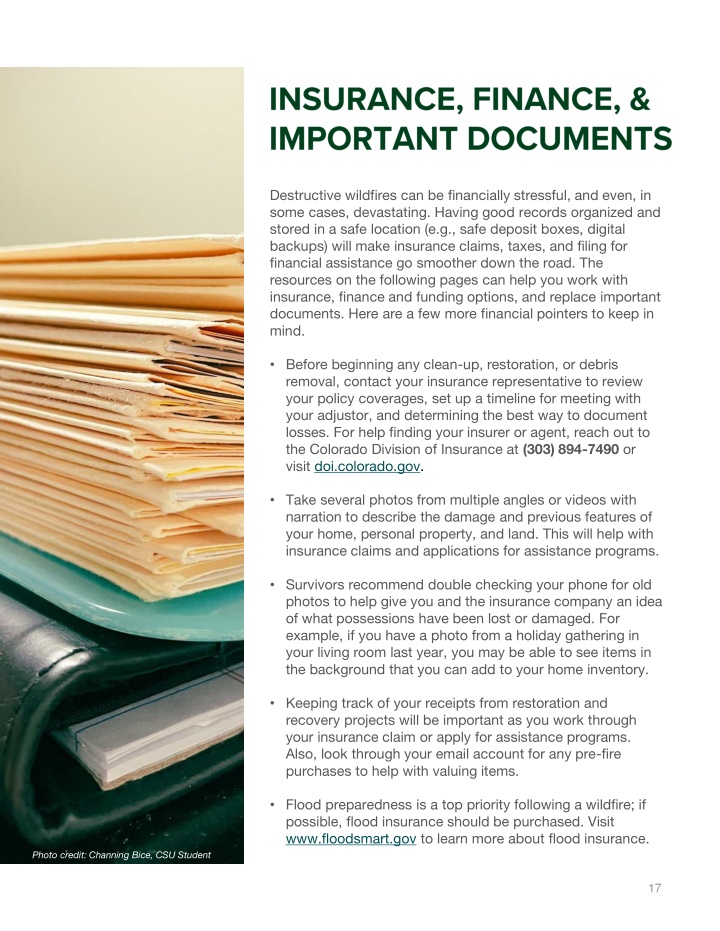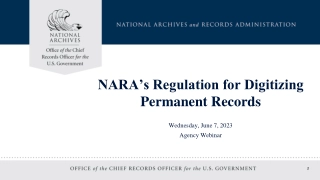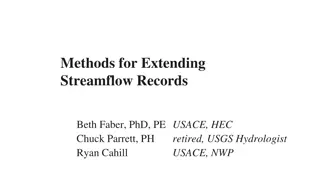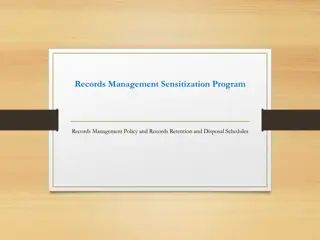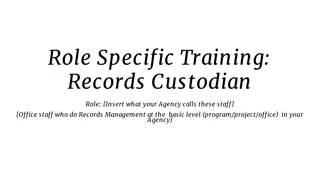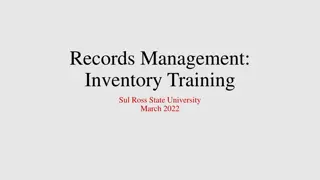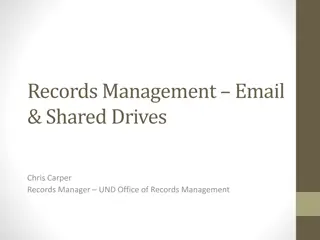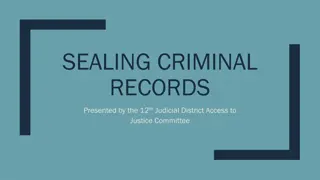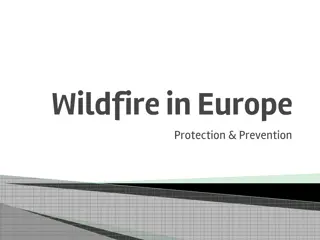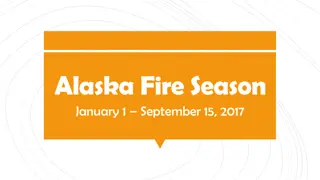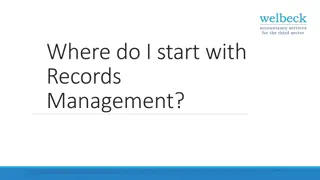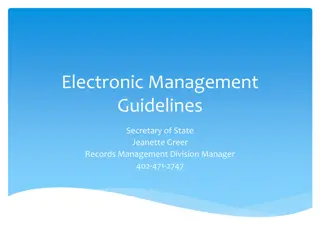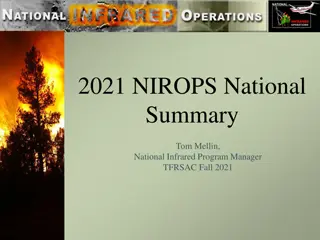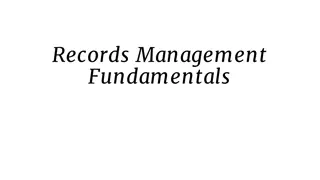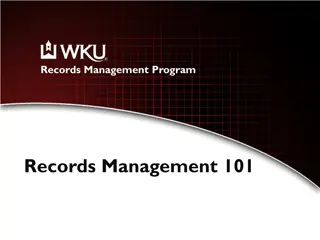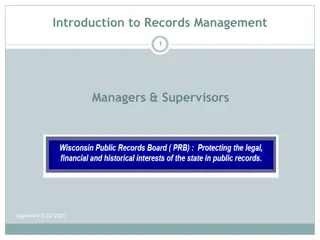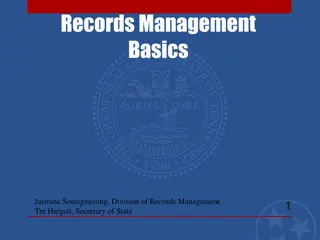Organizing Records for Financial Stability Amid Wildfires
Wildfires can bring financial stress and devastation, but organizing records in a safe location is crucial for streamlining insurance claims, taxes, and financial assistance applications in the future.
Download Presentation

Please find below an Image/Link to download the presentation.
The content on the website is provided AS IS for your information and personal use only. It may not be sold, licensed, or shared on other websites without obtaining consent from the author.If you encounter any issues during the download, it is possible that the publisher has removed the file from their server.
You are allowed to download the files provided on this website for personal or commercial use, subject to the condition that they are used lawfully. All files are the property of their respective owners.
The content on the website is provided AS IS for your information and personal use only. It may not be sold, licensed, or shared on other websites without obtaining consent from the author.
E N D
Presentation Transcript
Destructive wildfires can be financially stressful, and even, in some cases, devastating. Having good records organized and stored in a safe location (e.g., safe deposit boxes, digital backups) will make insurance claims, taxes, and filing for financial assistance go smoother down the road. The resources on the following pages can help you work with insurance, finance and funding options, and replace important documents. Here are a few more financial pointers to keep in mind. Before beginning any clean-up, restoration, or debris removal, contact your insurance representative to review your policy coverages, set up a timeline for meeting with your adjustor, and determining the best way to document losses. For help finding your insurer or agent, reach out to the Colorado Division of Insurance at (303) 894-7490 or visit doi.colorado.gov. Take several photos from multiple angles or videos with narration to describe the damage and previous features of your home, personal property, and land. This will help with insurance claims and applications for assistance programs. Survivors recommend double checking your phone for old photos to help give you and the insurance company an idea of what possessions have been lost or damaged. For example, if you have a photo from a holiday gathering in your living room last year, you may be able to see items in the background that you can add to your home inventory. Keeping track of your receipts from restoration and recovery projects will be important as you work through your insurance claim or apply for assistance programs. Also, look through your email account for any pre-fire purchases to help with valuing items. Flood preparedness is a top priority following a wildfire; if possible, flood insurance should be purchased. Visit www.floodsmart.gov to learn more about flood insurance. Photo credit: Channing Bice, CSU Student 17
______________________ ______________________ Below is a list of questions that people frequently ask their insurance company following a major loss that you may find useful. Feel free to modify, add, or remove questions for your situation and don t forget to take good notes. Questions adapted from Insurance Institute for Business and Home Safety. ______________________ ______________________ ______________________ ______________________ How much is my home (or property) insured for? ______________________ What is covered by my insurance policy and how much is my deductible? ______________________ ______________________ When should I expect to hear from my adjuster? ______________________ Does my policy cover the replacement value for my home and property? ______________________ ______________________ What is the best way for me to document damage and start my inventory? Is there a specific template or form I should use? ______________________ ______________________ Does my policy cover additional living expenses? If so, for how long or is there a spending limit? ______________________ ______________________ Does my policy include debris removal and clean-up coverage? ______________________ What coverage do I have for my detached buildings (garage, shops, barns)? ______________________ ______________________ Does my policy help cover the cost of replacing trees, shrubs, and other landscaping? ______________________ ______________________ Does my policy cover the increased cost of upgrades based on changes in building codes or laws? If so, how much? ______________________ What coverage do I have in case of post-fire flooding? If I don t have coverage, what options do I have? ______________________ ______________________ Will my homeowners policy or automobile policy pay for vehicles that were parked in my garage and damaged? ______________________ ______________________ Are there any discounts I qualify for or ways I can decrease my premium? ______________________ 18
As you assess losses and begin working with insurance, check out the resources below for templates, pro-tips, and more information. Ag Damage Assessment Your Step-by-Step Home Insurance Claim Create Home Inventory Partial Loss Fire Coloradans Impacted by Wildfires Letters and Docs 19
Disaster Losses and Related Tax Rules Rural Tax Education Disaster Losses and Related Tax Rules Weather-Related Sales of Livestock Rural Tax Education Weather Related Sales of Livestock Properties Destroyed by Natural Disaster (Video) Colorado Division of Taxation Properties Destroyed by Natural Disaster Wildfire Relief American Red Cross Wildfire Relief Disaster Assistance Programs Farm Service Agency Disaster Assistance Programs Emergency Watershed Protection Program Factsheet Natural Resources Conservation Service NRCS Fact Sheet Grants & Funding Assistance Colorado State Forest Service Grants & Funding Assistance Photo credit: Channing Bice, CSU Student [County Name] Treasurer (XXX) XXX-XXXX [link] [County Name] Assessor (XXX) XXX-XXXX [link] [County Name] Farm Service Agency (FSA) (XXX) XXX-XXXX [link] [County Name] Commissioners (XXX) XXX-XXXX [link] [Local] IRS Office ((XXX) XXX-XXXX [link] [County Name] Clerk & Recorder (XXX) XXX-XXXX [link] 20
If you were unable to make it out of your house with important personal documents, check out the table below for more information on how to replace them. Visit Colorado s DMV online portal at mydmv.colorado.gov or call (303) 205-5600. Contact your financial institution or the FDIC at (877) 275-3342 or www.fdic.gov. Contact the issuing institution: American Express: (800) 528-4800 or www.americanexpress.com Discover: (800) 347-2683 or www.discover.com Mastercard: (800) 307-7309 or www.mastercard.us Visa: (800) 847-2911 or usa.visa.com Visit www.ssa.gov or call (800) 772-1213 For Colorado-issued birth or death certificates, contact CDPHE Vital Records by calling (303) 692-2200 or visiting cdphe.colorado.gov/vitalrecords. For out-of-state issued birth or death certificates, visit www.cdc.gov/nchs/w2w/index.htm For birth or death certificates issued abroad, visit travel.state.gov/content/travel/en/records-and- authentications.html Copies of marriage and divorce records are available from the county that issued them. For [County Name] records contact the county clerk at (XXX) XXX-XXXX or visit [link]. Contact the U.S. State Department at (877) 487-2778 or visit travel.state.gov/content/travel/en/passports/have-passport/ lost-stolen.htm. Find your local IRS office at www.irs.gov/help/contact-my- local-office-in-colorado or call the [City Name] IRS office at (970) 241-6265. Contact the National Archives and Records Administration at (866) 272-6272 or visit www.archives.gov/contact. Replacing Important Documents in Colorado (CSU Extension): Replacing Important Papers Checklist of Important Legal Documents (FDIC): Checklist of Important Legal Documents Replace Your Vital Records (USA.gov): www.usa.gov/replace-vital-documents 21
